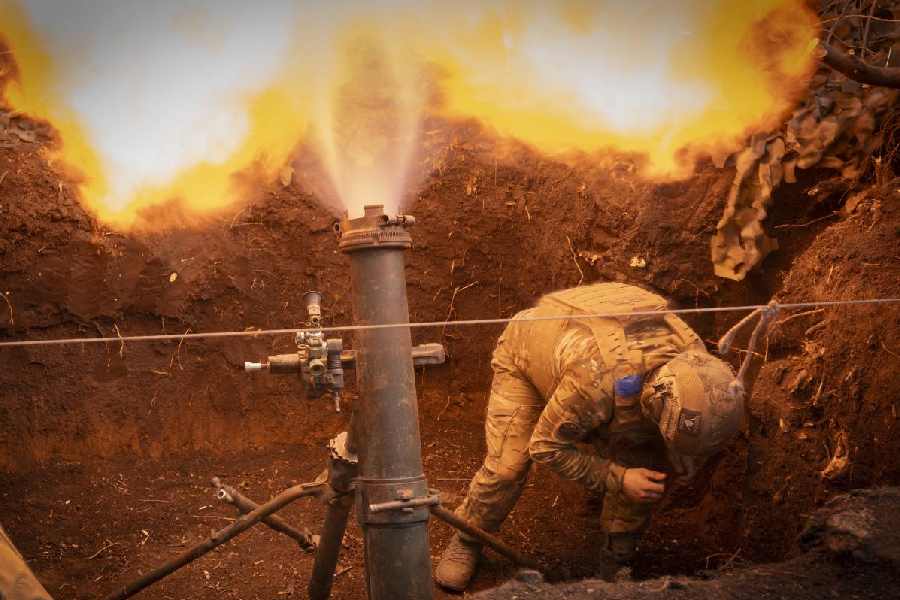For Vladimir Putin, Donald Trump’s win couldn’t come soon enough. Putin may reportedly accept a deal where Moscow gains significant territory in Ukraine (about the size of the US state of Virginia) and Ukraine remains neutral and forgets about any plans to join Nato or the EU.
Though Ukraine is experiencing war fatigue, so is Russia. Russia is making steady advances in the Donetsk region of Ukraine, but the Kremlin is still struggling to recruit soldiers for the conflict. The recent revelation that North Korean soldiers were fighting in Ukraine attests to this.
Even as Russia ramps up the war, with reports from Ukraine suggesting Moscow had fired its first intercontinental ballistic missile of the war, it’s become clear that a peace deal would be in the interests of Moscow, as much as Kyiv.
According to western assessments, around 115,000 to 160,000 Russian troops have died, 90% of the personnel it had at the beginning of the war. While another 500,000 have been injured. To offset these losses, Russia has been recruiting 20,000 new soldiers a month.
Recruiting soldiers into the army has never been that easy in Russia even during peacetime. Recruits are often subject to hazing and bullying by more experienced soldiers, and as such joining the army is viewed as something to be avoided by many young Russian men. Known as dedovshchina, Russian bullying, hazing and beating of conscripts has been a notable pastime in the Russian military since the end of the 17th century.
After the Soviet Union dissolved, the Russian media exposed the appalling conditions in the military, noting that troops suffered from poor medical care and severe malnutrition. Many Russians may also remember how poorly prepared conscripts were treated who were sent off to fight the war in Chechnya in the mid-1990s.
The Russian government does not appear to be concerned about the average Russian soldier’s safety and wellbeing. Already unpopular during times of peace, this desperation to avoid being drafted into an active war becomes even more acute.
The military is also seen as a major trap to catch the poor and underprivileged. Conscripts in the Russian army are viewed as meat for the grinder; their graves are ignored and the bodies are sometimes not identified.
Most of the recruits have come from far east republics with large indigenous populations such as Bashkortostan, Chechnya, the Republic of Sakha (Yakutzia) and Dagestan — or as far from Moscow as possible.
But even young men in Moscow are now facing an increasingly aggressive Russian state. Hundreds of thousands of Russians have fled the country, forcing the government to introduce a tougher draft law to round up troops.
With the new law, implemented on November 1 this year, instead of receiving a draft notice through the post, draft notices are now delivered online. Once the notice enters a Russian man’s digital mailbox, those called up are immediately barred from leaving the country and can face stiff penalties if they do attempt to leave.
This means that any time a Russian man is in contact with the government – to pay taxes, renew a passport or driver’s license, or receive any type of government service – the Russian government can contact them and automatically give them their draft card. Having an online presence in Russia — such as having a bank account or a mortgage or car loan – also makes it harder to evade the draft.
Since the start of the war, Russian men have resorted to all kinds of tactics to avoid being drafted – faking that they had a drug dependency, falsifying medical documents and even in some cases breaking their own bones.
Moving locations within Russia or purchasing property in someone else’s name was also a common tactic, but now these strategies have become more difficult. Someone I interviewed for this article was drafted even though they had not lived in Moscow since 2006. Struggling to find recruits, the Russian government has resorted to going after Russian citizens who live abroad.
Russia has also notably drafted prisoners, which include murderers and paedophiles. This has caused Russia’s prison population to plummet.
But Putin is running out of men. To attract more recruits, the ministry of defence has increased pay, making it more lucrative than civilian jobs, doubling the bonus for people enlisting in November of last year.
Relying on the North Korean military offers another solution, but North Korean troops have no combat experience, use different military tactics and most don’t speak Russian, which makes it more difficult to coordinate for specific combat operations.
Russian soldiers have complained that they do not know what to do with them. Though this would be widely unpopular in Belarus, Putin may try to force Belarus to offer support, as Belarusian soldiers are familiar with Russian tactics and operations.
In another sign of weakness, Putin is demonstrating that conventional war tactics are no longer enough. On November 19, Putin issued a threat that nuclear weapons could be used, in response to a Ukrainian attack using US made Atacms missiles in the western Bryansk region in Russia.
Usually when conventional war strategies are working, there is no need to lower the threshold for nuclear use.
Clearly, the war is not going particularly well for Ukraine either. They are struggling with their own recruitment issues and territorial losses. But it is a mistake to think that Putin is coming to the eventual negotiation table from a position of strength. Luckily for Putin, though he may be running out of men, a favourable deal may be on the horizon that fails to take this into account.
The Conversation
Except for the headline, this story has not been edited by The Telegraph Online staff and has been published from a syndicated feed.











